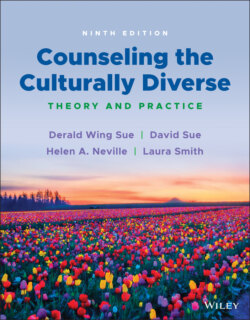Читать книгу Counseling the Culturally Diverse - Laura Smith L. - Страница 72
CULTURE‐BOUND VALUES
ОглавлениеCulture consists of all the things that people have learned to do, believe, value, and enjoy. It is the totality of the ideals, beliefs, skills, tools, customs, and institutions into which members of society are born (Ratts & Pedersen, 2014). Although being bicultural is a source of strength, the process of negotiating dual group membership can present challenges for many marginalized group members. Persons of color experience strong pressures to adopt the ways of the dominant culture, which tend to be seen as normal and good; in the meantime, their home culture may be viewed as “different,” “interesting,” “colorful,” or even overtly deficient. Cultural‐deficit models are viewpoints from which culturally diverse groups are seen as possessing inferior or dysfunctional values and belief systems; these features may then tacitly be considered sources of shame and/or disadvantages to be overcome. In essence, marginalized groups often receive the message that to be different is to be deviant, inferior, problematic, or ill.
Several culture‐bound characteristics of therapy may trigger and reinforce negative beliefs about diverse cultural communities. Many foundational assumptions about what therapy is and how it is properly conducted emerge from White Western European cultural values. Therapists whose own socialization is European American may not easily detect (or even notice) these linkages because these values are so taken for granted by them—yet they are values that may not be shared by the diverse communities of individuals who are part of American society. As a result, the demeanor of these clients may not fit the tacit therapeutic expectations held by therapist (meaning expectations that are assumed, unspoken, and may not even be fully conscious). These circumstances can lead the therapist to misevaluate the client, with the result that the client feels misunderstood by the therapist. These assumed and often unstated values include a focus on the individual, the valuing of expressiveness and insight, the expectation of self‐disclosure, a reliance upon particular communication styles and patterns, the prioritization of Western scientific empiricism, and an assumption of separateness between mental and physical spheres of being.
